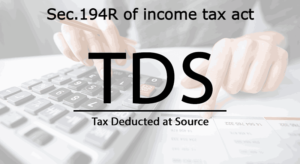Section 14A of income tax act provides that expenditure incurred by assessee in relation to exempt income is not deductible.
Further, section 14A inserted from assessment year 1962-63, provides that no deduction shall be made in respect of expenditure incurred by the assessee in relation to income which does not form part of total income income under the act.
In case of composite business, expenditure pertaining to income exempt from tax shall be determined as per method prescribed in rule 8D.
Expenditure pertaining to income not chargeable to tax-rule 8D of income tax rule
The expenditure in relation to income which does not form part of total income shall be the aggregate of the following:
1. Expenditure directly related to such income.
2. An amount equal to 1% of the annual average of the monthly average of the opening and closing balances of the value of investment (i.e. investment, income from which is exempt from tax).
However, the amount referred to in (1) and (2) shall not exceed the total expenditure claimed by the assessee.
Example of section 14A of income tax act
X is a commission agent of a manufacturing company. Besides, he has bonds of a few Indian companies as investor. He gives the following information pertaining to previous year 2022-23-
| Amount(Rs) | |
| Income from commission agency business | 10,00,000 |
| Interest received from tax free bond of public sector undertaking[income is exempt under section 10(15)] | 2,00,000 |
| Fees for consultancy paid to an investment consultant (it pertain to investment in above bonds, it is, however, deducted from commission agency business) | 10,000 |
| commission interest expenditure pertaining to taxable (i.e. commission agency business) and non-taxable (i.e. interest on above bonds)( entire interest is deducted while computing commission agency business income given above) | 40,000 |
| Investment in above bonds as on first and last date of each month (in Rs.) | Amount (Rs.) | Monthly average investment (in Rs.) | Amount (Rs.) |
| -April 1, 2022 | 14,00,000 | April 2022 | 15,00,000 |
| -April 30, 2022 | 16,00,000 | May 2022 | 17,00,000 |
| -May 31, 2022 | 18,00,000 | June 2022 | 12,75,000 |
| -June 30, 2022 | 7,50,000 | July 2022 | 8,00,000 |
| -July 31, 2022 | 8,50,000 | August 2022 | 13,75,000 |
| -August 31, 2022 | 19,00,000 | September 2022 | 23,00,000 |
| -September 30, 2022 | 27,00,000 | October 2022 | 19,00,000 |
| -October 31, 2022 | 11,00,000 | November 2022 | 11,25,000 |
| -November 30, 2022 | 11,50,000 | December 2022 | 12,50,000 |
| -December 31, 2022 | 13,50,000 | January 2023 | 12,75,000 |
| -January 31, 2023 | 12,00,000 | February 2023 | 13,00,000 |
| -February 28, 2023 | 12,00,000 | March 2023 | 13,50,000 |
| -March 31, 2023 | 13,00,000 | ||
Total monthly average Annual average of monthly average | 1,71,50,000 14,29,167 |
X claims out that out of Rs. 40,000, expenditure pertaining to interest income is zero. Likewise, he claims that fees paid to investment consultant pertains to commission agency business & nothing is spent for earning interest income . Assessing officer is not satisfied with the claim made by X.
Therefore,
(a) Expenditure directly pertaining to exempt interest income (i.e. consultancy fee) – 10,000
(b) Interest expenditure pertaining to interest income [ being 1% of the annual average of monthly average of opening and closing balance of the value of investment in tax-free debentures(i.e. 1% of Rs. 14,19,167)] – 14,192
Expenditure pertaining to exempt income [ i.e. (a)+(b)] 24,192
Business income chargeable to tax (i.e. 10,00,000+ 24192) 10,24,192
Important points pertaining to section 14A of income tax act
1. The above provision of rule 8D shall be apply only if the A.O. is not satisfy with the correctness of the claim of expenditure made by the assessee.
2. Section 14A has been amended to clarify that these provisions shall apply where the income (not forming part of total income) has not accrue or arise has not been received during the previous year. But expenditure has been incur during the said previous year in relation to such income.
In other words such expenditure shall be disallow. Even if during the relevant previous year exempt income is not receive or accrued.
3. Further, section 14A applies to all heads of income and aims at disallowance of expenditure incurred in relation to income which do not form part of total income.
4. Where the actual expenditure to the exempt income is identifiable. The principle of apportionment of such expenditure by applying section 14A read with rule 8D is not possible.
5. And, section 14A is applicable as per the methodology given in rule 8D. In respect of depreciation no part can be disallow by applying section 14A.
6. Amounts borrowed for investment in foreign subsidiaries will not attract section 14A for the reason that the dividend from foreign companies are chargeable to tax. And being not an exempt income , the disallowance of interest on monies borrowed will not apply.
7. Disallowance contain in section 14A cannot be apply in respect of incomes which are eligible for deduction under chapter VI-A or eligible for deduction under any other provision.
8. Where tax free investments were made much earlier out of own funds. The subsequent borrowings by way of bank loan will not lead to disallowance of any part of interest expenditure u/s 14A.
9. All expenses relate to exempt income have to be disallow u/s 14A,. Regardless of whether they are direct or indirect, fixed or variable and managerial or financial in accordance with law.



